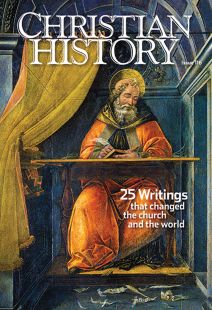Great Writings, Did you know?
Our 25 writings “by the numbers”
The earliest of these famous writings was composed around 175–185 (Irenaeus’s Against Heresies); the latest in the twentieth century (C. S. Lewis’s Mere Christianity, or, if you count by when he finished the book, Karl Barth’s Church Dogmatics). The longest is probably a tie between Church Dogmatics and Summa Theologiae, and the shortest is the Nicene Creed. Three of the works (the Nicene Creed, the Book of Common Prayer, and the Westminster Confession) were officially composed by church councils or committees, though the Book of Common Prayer is acknowledged to be largely the work of Thomas Cranmer.
Order Christian History #116: Twenty-Five Writings that Changed the Church and the World in print.
Subscribe now to get future print issues in your mailbox (donation requested but not required).
In addition to theological treatises, the list includes an autobiography (the Confessions), two fictional narratives (Pilgrim’s Progress and the Divine Comedy), and a church liturgy (the Book of Common Prayer). The most frequent author is Augustine (4 works in the top 25), followed by Luther (3), and then everyone else is in a tie for third.
Only one book was written by a pope (Gregory’s Pastoral Rule), but all the other authors were pastors or monks except Dante and C. S. Lewis. Translated into today’s terms, their countries of origin include Egypt, France, Germany, Switzerland, Italy, England, Turkey, and the United States. CH
25 Classic Works
#1. Augustine, Confessions (c. 398)
#2. Thomas Aquinas, Summa Theologiae (1265–1274)
#3. John Calvin, Institutes of the Christian Religion (1536)
#4. Augustine, City of God (413–426)
#5. Martin Luther, 95 Theses (1517)
#6. John Bunyan, Pilgrim’s Progress (1678)
#7. The Nicene Creed (325, revised 381)
#8. C. S. Lewis, Mere Christianity (1952)
#9. Athanasius, On the Incarnation (c. 319)
#10. Thomas à Kempis, The Imitation of Christ (c. 1418–1427)
#11. Benedict, Rule (c. 540s)
#12. The Book of Common Prayer (1549)
#13. Dietrich Bonhoeffer, The Cost of Discipleship (1937)
#14. Martin Luther, Freedom of a Christian (1520)
#15. Karl Barth, Church Dogmatics (1932–1967)
#16. Dante Alighieri, The Divine Comedy (c. 1308–1320)
#17. Anselm, Why God Became Man (c. 1095–1098)
#18. Augustine, On Christian Teaching (397–426)
#19. Augustine, On the Trinity (c. 400–428)
#20. Westminster Confession (1646)
#21. Irenaeus, Against Heresies (c. 175–185)
#22. John Wesley, A Plain Account of Christian Perfection (1777)
#23. Jonathan Edwards, Religious Affections (1746)
#24. Pope Gregory I, Pastoral Rule (c. 591)
#25. Martin Luther, Lectures on Romans (c. 1515–1516)
Read the stories behind these 25 writings and many more that almost made the list in the Christian History magazine, issue 116.
This article is from Christian History magazine #116 Twenty-Five Writings that Changed the Church and the World. Read it in context here!
By the editors
[Christian History originally published this article in Christian History Issue #116 in 2015]
Next articles
Editor's note: Twenty-five writings
How could we ever pick 25 Christian books to feature as the most important?
Jennifer Woodruff TaitFully man and fully God
The Nicene Creed [#7] and Athanasius’s On The Incarnation [#9] explained the Trinity to us
Jennifer FreemanThe Apostles’ Creed [#26]
The Apostles’ Creed summarized the basics of Christian faith
Jennifer FreemanIrenaeus, Against Heresies [#21]
Against Heresies attacked an early and pervasive Christian heresy
Jennifer FreemanSupport us
Christian History Institute (CHI) is a non-profit Pennsylvania corporation founded in 1982. Your donations support the continuation of this ministry
Donate




